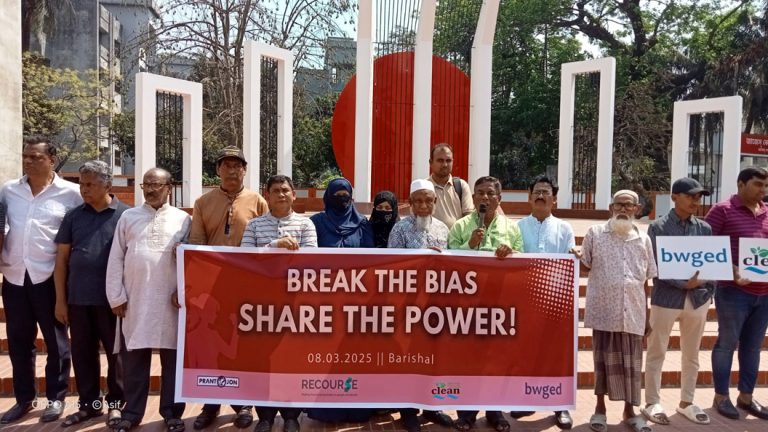March 8, 2025, Barishal: On the occasion of International Women’s Day 2025, a unique campaign was organized in Barishal to call for women’s empowerment in the power and energy sector, ensuring their energy rights, and recognizing their role as policymakers. This initiative was jointly organized by PRANTOJON, CLEAN (Coastal Livelihood and Environmental Action Network), and BWGED (Bangladesh Working Group on Ecology and Development). The primary objective of this campaign was to ensure 100% renewable energy across the country and establish energy security for women.
Participants in the campaign emphasized the importance of expanding renewable energy and increasing women’s inclusion in the energy sector. They stressed that to ensure sustainable development, women must have greater decision-making opportunities in the energy sector, and fair access to energy at all levels must be ensured.
Tauhedul Islam Shahzada Executive Director of Prantojon Trust, stated, “Women are the largest consumers of energy, as 46% of the total energy used in the country is for household purposes. However, due to the continuous rise in electricity prices caused by imported fossil fuels, women are the ones suffering the most.”
He further added,“Women are deprived at all levels in the energy sector, from planning to implementation, and from generation to distribution. As women own only 2-4% of the land nationwide, energy project developers exclude them and consider them merely as beneficiaries in the consultation process. Women are viewed as a ‘sensitive issue’ rather than being recognized as active stakeholders and policymakers.”
Another participant in the campaign highlighted the severe challenges faced by women due to fossil fuel-based power plants, saying, “Unlike men, women cannot easily migrate when affected by power plant projects. The influx of outsiders in local areas creates obstacles for women in terms of mobility, personal health, sanitation, and fulfilling their basic needs. In most cases, women are only included in the consultation process to meet the mandatory requirements of the Environmental Impact Assessment (EIA), but their opinions are not genuinely considered.”
Another campaigner stated, “Project developers always ignore the special needs of women, particularly reproductive health concerns. Fossil fuel-based power plants, especially coal-fired ones, emit excessive levels of mercury, lead, cadmium, sulfur, and chromium. These toxic metals have devastating effects on women’s reproductive health. Even though women are the most immediate and innocent victims of this pollution, they are not entitled to any compensation because they do not own land.”
The campaign activists called on the government to take necessary measures to facilitate easy installation of solar home systems for women.
The event was attended by CAB Barisal Secretary Mr. Ranjit Dutta; Advocate Subhash Das, Member Secretary of Barisal Forum on Ecology and Development; Member Mr. Shubhankar Chakraborty; Member Akhtarul Kabir; Arehi Executive Director Mr. Khorshed Alam, and others.

